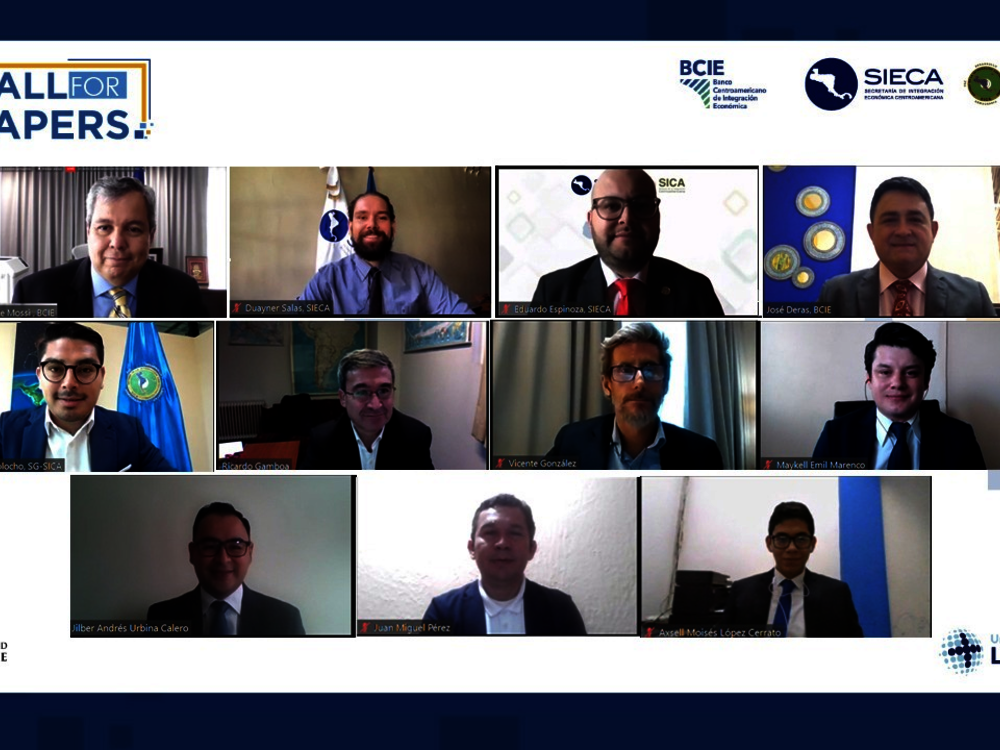SG-SICA, SIECA and CABEI award three research articles from the 4th edition of the "Call for Papers"

Authors from Honduras and Nicaragua won the first three places in the fourth edition of the contest, promoted by the General Secretariat of the Central American Integration System (SICA), the Secretariat for Central American Economic Integration (SIECA) and the Central American Bank for Economic Integration (CABEI), as regional integration bodies.
Central America, July 20, 2022. Three articles formulated by researchers from Honduras and Nicaragua were awarded in the 4th edition of the Call for Papers: Central America, Advances and Challenges 200 years after its Independence.
El Salvador, Honduras, Guatemala, Nicaragua and Costa Rica dominated participation in this edition of the Call for Papers, with research focused on thematic areas such as climate change, technology, integration processes, education, economics, regional value chains, migration, institutions, poverty, entrepreneurship, employment and legal issues. There were also contributions from the United States, Panama, Mexico and Argentina.
The call for research articles was open from October 28, 2021 to February 25, 2022. The papers received had to meet a series of evaluation criteria such as: clarity and precision in writing, originality, validity and scientific support, contribution to the status of the art of knowledge, and compliance with editorial standards.
In this edition, two important strategic allies, the University of Chile and the Loyola Andalucía University of Spain, joined this initiative with the aim of creating a high-level space for the generation of knowledge and specialized research in the field of integration.
The three winning articles were awarded funds totaling US$12,000, in the following order:
First Place: $6,000.00 plus a 50% scholarship for a Master's Degree in International Studies at the University of Chile.
Second Place: $4,000.00 plus a 100% scholarship for a diploma program at the Institute of International Studies of the University of Chile.
Third Place: $2,000.00 plus a 100% scholarship for an online course at the Institute of International Studies of the University of Chile.
In cases of co-authorship, the award will be divided and given to each co-author in equal parts.
Winning papers of the 4th° edition of the Call for Papers
The articles were evaluated by an Editorial Committee made up of representatives from each of the institutions participating in the call for papers: the General Secretariat of the Central American Integration System (SG-SICA), the Secretariat for Central American Economic Integration (SIECA) through the Center for Economic Integration Studies, and the Central American Bank for Economic Integration (CABEI) through the Regional Center for Innovation and Technology, as well as under the advice of the Universities of Chile and Loyola Andalucía, taking into account compliance with editorial standards, the thematic relevance and proper structuring of the article. The prizes were awarded as follows:
First place: Measuring the degree of Central American economic integration via interconnectivity dynamics and spillovers. By: Jilber Andrés Urbina Calero and Maykell Emil Marenco, from Nicaragua.
Second place: Central America United for the Global Coffee Value Chain: an analysis of the region's potential in the world coffee market. By: Juan Miguel Perez, from Honduras.
Third place: Economic growth and balance of payment restrictions in Central America (2009-2020). By: Axsell Moisés López Cerrato, from Nicaragua.
Honorable Mentions
In addition, eight articles received honorable mentions for their outstanding research work:
- Central American Integration Index: A methodological proposal. By: Adolfo Enrique Rocha Santana, Nicaragua.
- Environmental governance and climate justice as foundations for resilient Central American integration: Insights from the performance of the 2030 Agenda, the effects of Covid-19 and the COP26 agreements. By: Jose Rodrigo Rojas Morales, Costa Rica.
- Blockchain and tokenization - Opportunities and challenges for Central America. By: Fernando Enrique Hernández Casco, Honduras.
- Strengthening Regional Value Chains: guidelines for greater articulation based on tourism service. By: Marcelo Gabriel Bonzón, Argentina; Pablo Alarcón, Guatemala.
- Education must continue: Central America facing the pandemic by COVID-19. By: Héctor Rafael Bernal Hernández, Nancy Liliana Funes González, Joselyn Elizabeth López Ortega and Génesis Amanda Lozano González, from El Salvador.
- The Care Economy and its Effects on the Economic, Physical and Political Autonomy of Central American Women. By: Daniela Araya Villalobos and Georgianella Barboza González, both from Costa Rica.
- The citizen before the Central American Court of Justice. Special reference to the competence "when in fact the judicial decisions are not respected". By Eymi Lissette Esquivel Avendaño, Nicaragua.
- Regional institutionality in the face of the Fourth Industrial Revolution: transition towards digital governance. By Gabriela Eunice Alfaro Umaña and Marjorie Berenice Turcios Alvarenga from El Salvador.
The call sought to put into perspective and influence the current academic debate through the publication of research articles from the historical, political, economic, commercial and institutional aspects, with special emphasis on those elements that link the regional integration process to the current global context.
Call for Papers 4th Edition Awards Ceremony
During the award ceremony, CABEI's Executive President, Dr. Dante Mossi, stated that "we are very proud to support a new edition of the Call for Papers Award, an initiative in which we promote research and science, important elements that motivate us to continue working and to promote research among the region's young talents.
Ricardo Gamboa, professor and representative of the University of Chile, and José Manuel Martín Lozano, Director of the ETEA Foundation of the Universidad Loyola Andalucía, also participated in this activity. They emphasized that by being part of this type of initiative they seek to contribute to strengthening the Central American integration process, as well as adding experiences and research capabilities.






